Dr. Marie Haynes shares her thoughts on whether or not there is benefit in using Google’s disavow tool today. You’ll see how the example links that Google sends following a failed reconsideration request are dramatically different than they were years ago. Many of the example links given today are links that we suspect you might consider “white hat”. The article concludes with our current advice on which sites could benefit from using the disavow tool in 2022.
Note: This article was originally titled, “Should you disavow links in 2021?”. Our disavow advice has not changed since then. If you are trying to decide whether to disavow links today, the advice in this article is still very relevant and based on 11 years of strategizing with our clients and experimenting with Google’s disavow tool.
In this article:
- Is Google still giving out manual actions for unnatural links?
- Example links from the early days of manual actions as compared to today
- What does it mean if the example links given to you actually are natural mentions?
- Why does Google still give out manual actions for unnatural links?
- Mention building instead of link building
- Our experience with disavowing at MHC in 2020-2021
- Is negative SEO via link spam effective?
- A note re tools that help you audit links
- Conclusions and MHC’s recommendations to help you decide whether to disavow
At MHC, our stance on the value of the disavow tool has changed over the years. In 2012, before the tool existed, we cleaned up Google penalties for clients by working hard to remove manipulative links from the web. From 2013 to 2016 we performed full manual link by link audits and filed disavows for hundreds of websites. We had many beautiful recovery stories. In late 2016, when Google’s algorithms changed so that the Penguin algorithm no longer demoted websites with unnatural links, but simply ignored them, our strategy changed again. We stopped recommending link audits for most cases, with the exception being sites currently dealing with a manual action for unnatural links.
In late 2018, our disavow advice changed once again. A new client came to us wanting a link audit, despite the fact that they had no manual action. When this happens, our first plan of attack is generally to recommend what we call a link overview. For this report, an MHC link auditor spends a couple of hours digging through a site’s link profile to determine whether a full manual link by link audit has potential to help. In most cases when we do this overview, our advice is that a full manual link audit and thorough disavow filing would not be worth the time and money spent. If Google is ignoring unnatural links algorithmically, why would filing a disavow to tell Google specifically which links to ignore help improve rankings?
When we finished the link overview for this client, we found that a large portion of their link profile consisted of self made links in articles, or low quality directory links, most of which were keyword anchored. Our conclusion was that if this site was reviewed by a member of Google’s webspam team, they would likely receive a manual action for unnatural links. We recommended a full link audit followed by filing a disavow through Google’s disavow tool. Our thought was that the disavow likely would not help improve traffic, but it was a good idea to file it to prevent the site from receiving a manual action in the future.
We filed a thorough disavow in August of 2018. We were quite interested to see whether this filing had an effect as it does not happen often that the only thing we do to help a website is file a disavow. We had not recommended any other quality fixes for this website. If the disavow was responsible for this growth, it is quite spectacular!

SEMrush’s traffic estimates for this site do an even better job of showing the dramatic improvements this site made after filing a thorough disavow. These improvements were not connected to the August 1 medic or other core updates. You can’t see the traffic going back as far as 2012 as it is quite low, (fewer than 50 visitors a day) compared to the growth seen following filing a disavow. This site had been trying to manipulate Google by building their own links for YEARS. We believe a thorough disavow file released this site from an algorithmic suppression.
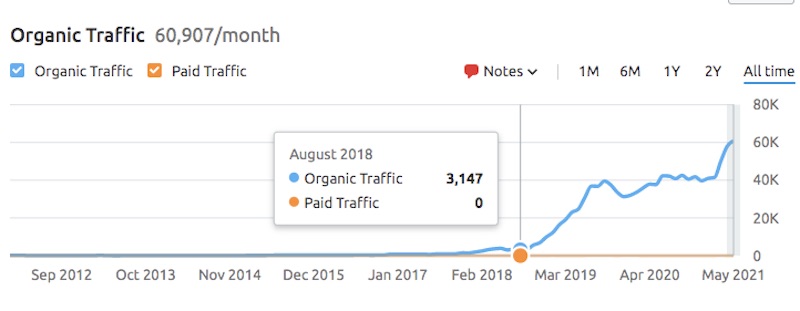
Shortly after this happened, I, Marie, had the opportunity to attend a filming of a Google help hangout in New York City where I was able to ask John Mueller whether unnatural links could still algorithmically affect a site’s ability to rank to its full potential. His answer was that yes, it was indeed possible.


We feel that what John was talking about here was what happened with the case I mentioned above. This site had enough truly manipulative links that were made solely for SEO purposes that we feel that Google’s algorithms lost trust in their entire link profile, resulting in a suppression of the site’s ability to rank. When we asked Google to disregard a large number of these links from their algorithmic calculations for this site (by using the disavow tool), our suspicion is that the suppression lifted and this site is now able to rank to its full potential.
We have filed many disavows since then, and in some cases we have seen nice improvements. However, most recently, the only sites that we have seen improvements in following a disavow, are ones that had been building unnatural links on a very large scale.
At MHC, we do still believe the disavow tool can be helpful for some sites…but we believe that most websites will not benefit from filing a disavow in 2021.
Is Google still giving out manual actions for unnatural links?
Our business was founded on helping sites remove Google manual actions. When I wrote the book on Google unnatural link penalties that many SEO agencies use as their process for removing these, I did not think that I would still be removing manual actions in 2021.
In 2013, it was not uncommon for me to have five to ten requests for help with a penalty per week in my inbox. Google used to give out a LOT of manual actions. Today, despite the fact that our company is known for this service, we get only a small handful of businesses reaching out for help with manual actions each month. The ones that we do get, are quite different cases as compared to what I worked on eight years ago.
Example links from the early days of manual actions as compared to today
Some of you may recall when in 2012 Google confused site owners by sending out a large number of manual actions with hard to interpret wording. We had many debates in SEO forums over whether this message was telling site owners that they needed to do anything or whether these messages could be ignored. It sounded like Google was saying, “Hey! We noticed unnatural links pointing to your site and we know that you may not control them and if you feel like it you could spend hundreds of hours cleaning this up and file a reconsideration request, and it may or may not help.”
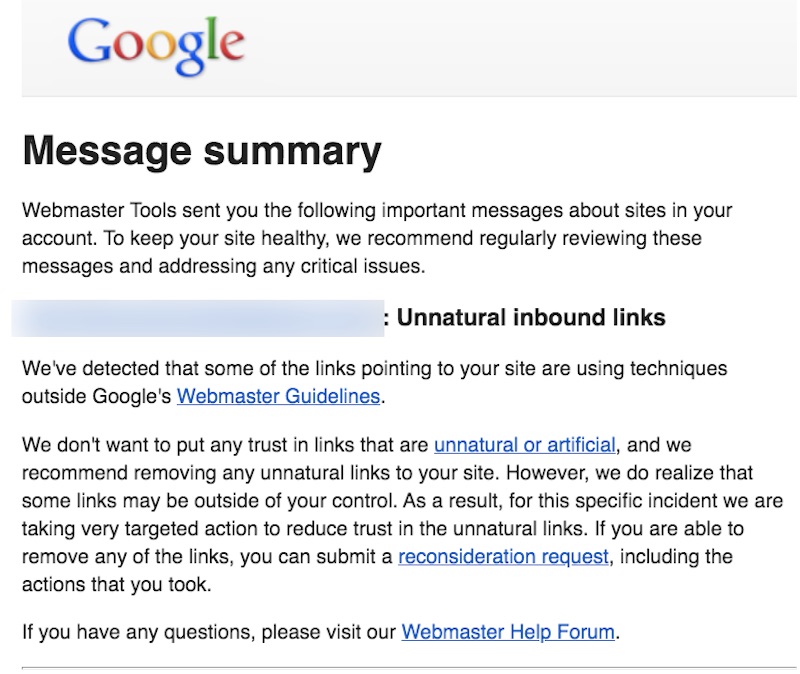
In Google’s documentation about these messages, it is interesting to see them list the types of links that were targeted with this wave of manual actions.

This was indeed the type of link we would find when auditing the backlink profile of sites that were dealt manual actions eight years ago – low quality links that were incredibly easy to create. These are the types of links that today, we feel Google’s Penguin algorithm can simply ignore. Google knows these are not recommendations worth counting.
I dug back through some old files to find a few examples of unnatural links that Google had sent us many years ago.
It was really common for Google to give us examples links that were in low quality directories, created only for SEO:
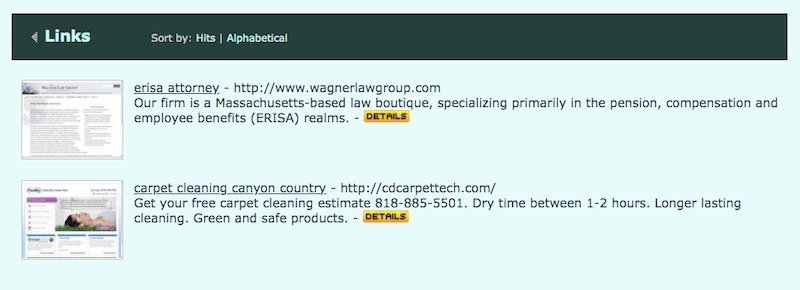
And also automated forum post spam:
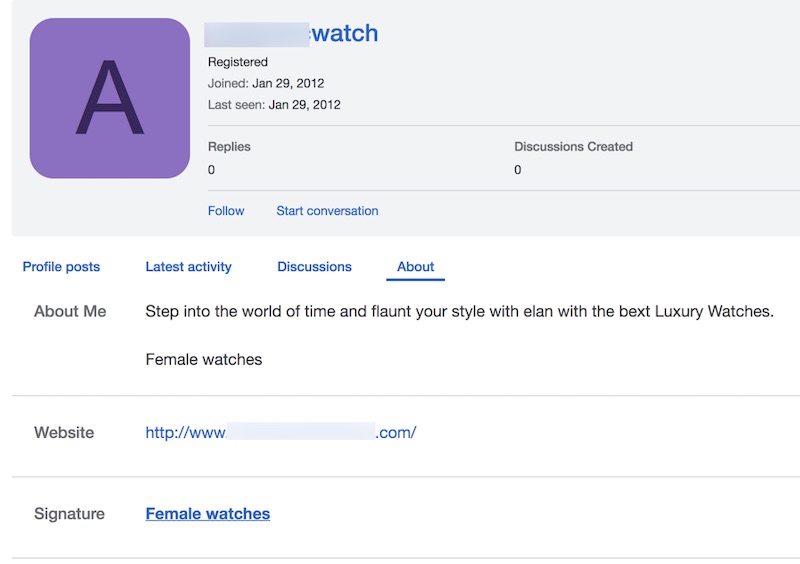
We would occasionally be given example links that were self-made, usually keyword-anchored links in low quality articles.
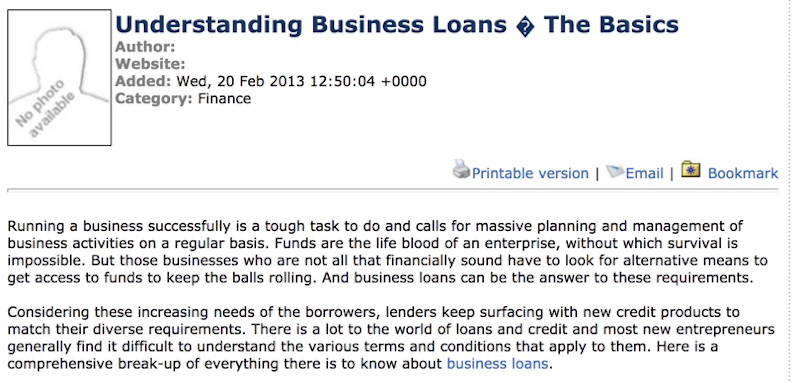
Today, we still do get example links from Google, but they usually aren’t low quality spam like I have shown above.
Most of the example links that Google gives us today for failed reconsideration requests are links in articles that many SEOs would consider good “white hat” links.
Here is an email we received following a recent failed attempt at reconsideration for a client of ours. You can see that Google gives us examples of the types of links that still persist despite them being manipulative in Google’s eyes.
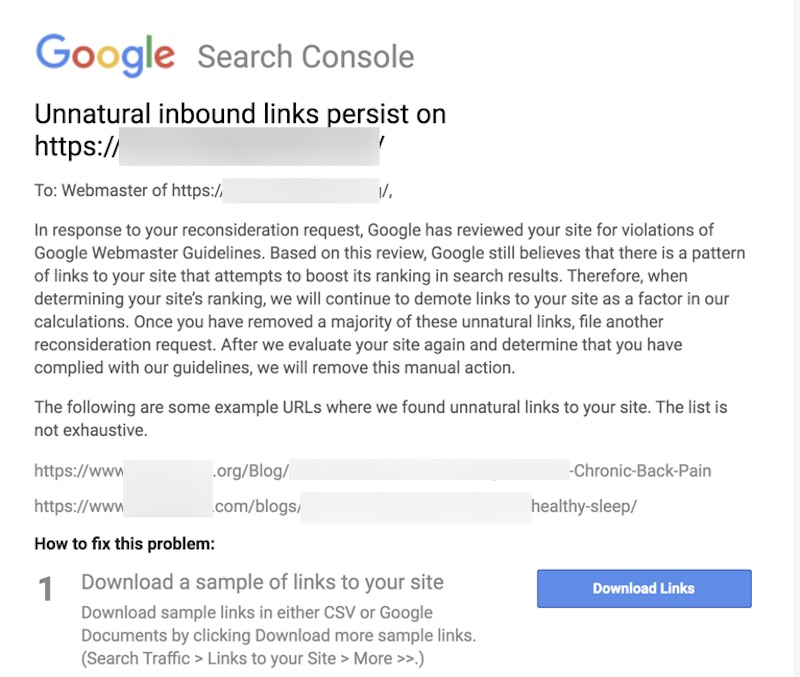
We’ll share a few examples. I should note that these are not the exact pages Google gave as examples, as sharing these could expose our clients. But these types of links are very similar to ones that Google has shared with us as the type that they would like to see removed or disavowed.
Many examples given to us were keyword anchored placements within articles.

Those are fairly obvious examples of unnatural links that were built only for SEO purposes. If you are still building links like this, Google has told us repeatedly that this type of practice goes against their guidelines. It may have worked to improve rankings years ago, but at MHC, we do not believe this type of link building just for the sake of link building can help you rank better today. This practice has been frowned upon by Google for years. Here is some reading for those of you who are still putting effort into this type of link building:
The decay and fall of guest blogging – written in 2014 by then head of webspam at Google, Matt Cutts.
Google warns against misusing links in syndication & large-scale article campaigns – from Danny Sullivan in 2017 when he was with Search Engine Land (prior to working at Google)
What has been most interesting to see are the example links Google gives us that are not overtly keyword anchored. It is not possible for me to share screenshots of these next examples as they are very specific to our clients, but here are some of our thoughts on the frustrating example links we have received back during our attempts at filing reconsideration requests over the last year.
Types of example links given to us this year
As you read these take note! We are not saying that the following types of links should all be considered unnatural in every situation. We will explain soon why we felt Google chose to give these as examples to these clients. In most cases though, sites that get a manual action for unnatural links now are ones that have been building links that move the needle, and doing it on a massive scale.
Mentions in random articles around the web – The majority of the example links given to us were ones that our auditors could clearly label as made for SEO. Many of these looked similar to those links in articles shown above — many were keyword anchored, but not all. In most of these cases, looking at other posts on the linking site would reveal that linking out unnaturally was common for this site. Most of the sites that were flagged as linking out unnaturally to our clients were either created for link building, commonly linked out unnaturally to many sites, offered guest posts to almost anyone, or just clearly served no purpose other than to try and manipulate Google.
However, we had several example links given to us that most of you reading this article would consider as “white hat” and acceptable to Google:
A scraped Medium article – The client had written an article and posted it on Medium. It contained a keyword anchored link pointing back to their site, but it was nofollowed. However, several sites copied Medium and republished this as a followed link. One of these was given as an example as an unnatural link.
A mention from a journalist in a news article – I really wish I could show you this one…but if I blurred out all of the confidential information, there would be nothing of value left to show. This link was in an article on a news website that deals with a current new financial issue that many are facing. In the article, there is a line that essentially says, “According to ClientName of BusinessName, this is what’s happening….They share more in a blog post.”
That link was not keyword anchored. “Blog post” was the anchor.
A mention in a DA 63 (Moz domain authority) financial site – This was another case in which our client had been quoted within an article that had value to readers. The link once again was anchored with “blog post”.
A link in a directory for finding accountants – According to SEMrush this site gets about 5000 daily visitors. It is not a spammy directory. Our client’s link was anchored with their url, and also a button saying, “visit website”. While they are not accountants themselves, it does make sense for them to be listed in this directory. However, in all reality, this link was only made for SEO purposes.
A mention in a well known authoritative website – Our client broke some news in their industry. This news site linked to our client’s article using the anchor “posted this message”. Again, not a paid placement.
Does this mean that now links from Medium, valid directories and news mentions are unnatural? This is not at all what we are saying.
What does it mean if the example links Google gives you actually are good mentions?
These links are likely bucketed as “suspicious” because Google’s algorithms are struggling to know which links to count as recommendations and which to just ignore for these sites.
We believe that if the example links you are given really are natural mentions, it means that Google’s algorithms are having a hard time distinguishing which links should be counted as recommendations (i.e. links that pass PageRank) and which ones should be ignored.
If Google’s algorithms see a large amount of manipulation in your link profile Gary Illyes has said this can cause the Penguin algorithm to discount all your links.
"If Penguin sees signs of manipulation, it can decide to discount ALL the links, which can be pretty bad for a site." @methode #pubcon
— Marie Haynes (@Marie_Haynes) October 13, 2016
2. If #Penguin detects signs of manipulation it may decide to discount ALL links – good and bad.@methode #pubcon
— Sha Menz (@ShahMenz) October 13, 2016
I find this concept hard to explain, but here’s how I picture it. It’s like Google’s algorithms are saying, “Wow. This site has so many people linking to it and recommending it. We should rank it highly! But something seems off here….our algorithms can recognize that many of these so called recommendations are actually links that violate our guidelines. We’re not sure if we can trust ANY of the links pointing to this site as recommendations.”
When a site builds manipulative links at scale, I would imagine this creates a dilemma for Google in some situations, especially if the site itself is a good one. Let’s say a spammy affiliate site has been building links at scale. For any low quality or spammy links pointing to that site, Google’s Penguin algorithm will just ignore them. If the site still has some decent recommendations after those links are ignored, then those could pass PageRank. If the scale gets large enough to cause Google’s algorithms to ignore all of the links pointing to this site, then it likely will rank for nothing.
BUT….
What if the site that built manipulative links was one that Google really should be ranking well? What if that site was a valid business that people were searching for on Google? It would not reflect well on Google if they suppressed this site and its content. Some of the content on those sites is probably content that Google wants to rank.
In a perfect world, Google could just count the good recommendations and ignore the manipulative ones. I do think that one day, they will understand language enough to be able to do this very well. But for now, because their algorithms are confused by the mass attempts at manipulation, they have two choices:
1) ignore all links pointing to this site
2) Make a manual exception in your case to make it so that certain links do not pass PageRank (i.e. give a manual action for unnatural links.)
If Google gives you example links that truly are natural mentions it likely means that their algorithms are still seeing too many obviously manipulative links in your backlink profile for them to be able to trust links pointing to your site algorithmically.
Why does Google still give out manual actions for unnatural links?
Manual actions for unnatural links are for sites that have been overtly trying to trick Google’s algorithms into thinking that other people are recommending them.

In cases where sites have loads of spammy backlinks, Google’s algorithms can simply ignore those links. Manual actions are reserved for cases where an otherwise decent site has unnatural links pointing to it on a scale that is so large that Google’s algorithms is not comfortable ignoring them.
At MHC we believe Google when they say they ignore many of the links on the web. We also think that they are getting much better at understanding which links should be counted as recommendations and this will continue to improve as natural language processing capabilities evolve.
In late October of 2019, Google announced that BERT was live, saying it was the biggest change in search since Rank Brain. BERT is a framework that helps Google’s algorithms better understand language. Just a few days after this announcement, on November 8, 2019 we had a very large, unannounced Google update. Over a year later, we are still often contacted by sites who have been seeing declining Google traffic that started in November of 2019.
Our early analysis of the November 2019 update showed that in many cases, it affected websites that had been involved in relatively white hat link building tactics – round up posts, reciprocal links from recipe bloggers recommending each other’s recipes, guest posting, top ten lists, etc.
Sites that have lost traffic starting on November 8, 2019 likely will not recover by disavowing those links. We do not think that Google penalized sites that used these types of link building tactics. Rather, we do think it is possible that BERT helped Google get better at understanding which links really are recommendations worth counting. If true, this means that many of the links that we made in an effort to convince Google that others were recommending our content, simply stopped passing value in Google’s algorithms…resulting in a reduction in rankings.
It is also possible that as BERT helps Google better understand content, they may put less emphasis on links in their algorithms, and more on their understanding of the relevancy of the content itself. Either way, we do feel that in November of 2019, something changed that caused sites with a history of link building for SEO to see declines in rankings.
Google became the most popular search engine because they discovered that using links as a proxy for recommendations worked really well. We believe that as Google continues to progress in understanding language, there will be less and less need for them to hand out manual actions as they will be able to algorithmically determine with more and more certainty which links to ignore and which ones to count.
So why does Google still administer manual actions? Google gives out manual actions for unnatural links when they discover cases where their algorithms are counting a very large number of links as recommendations when really, they are just links made for the purpose of SEO.
When I shared examples earlier of seemingly natural mentions being given as examples of unnatural links by Google, it is important to know that each of these businesses had been heavily involved in building links for many years and they were very good at it. Many of the example links given to us really looked like natural mentions, but in reality, the only reason these links were sought out was to help improve Google rankings. And they were done on a very large scale.
Mention building instead of link building
Does this mean that we should not be link building at all? This really could be the full subject of an article on its own. In short, we do believe that certain types of link building, or as we prefer to call it, mention building can still be helpful for a site and have the potential to contribute to improved rankings. We believe these links will be valued, not ignored or penalized by Google’s algorithms provided they truly are recommendations from sites that can be trusted. Most likely, Google wants to count recommendations from sites with E-A-T (Expertise, Authoritativeness and Trustworthiness).
E-A-T matters when it comes to Google’s algorithmic calculations of how much value to place in a link. A link from a site that is lacking in E-A-T probably isn’t going to be worth a whole lot in Google’s eyes. But getting mentioned on sites that have good E-A-T, especially in a way that Google would see as a recommendation, is not always easy. Mention building to get people who matter truly recommending you is usually not something that can be legitimately accomplished on a large scale – unless people truly are recommending you all across the web.
Mention building means finding ways to get sites that matter in your industry to recommend you or be talking about you. Examples include being mentioned in the news, having your content referenced, and being quoted as an expert on a trustworthy, authoritative website writing on your topic.
When I say to find ways to get sites to recommend you, I really mean a true, actual recommendation from someone else – not fake things that kind of look like a recommendation. The following likely are not things that we believe Google’s algorithms would consider recommendations. There is a good chance Google ignores links like this and would consider these attempts at manipulation.
- You give a site content to publish that contains a link back to your site.
- The majority of guest posts – Regardless of whether the link is in your bio or in the main text.
- Reciprocal linking for the sake of SEO. I’m not saying reciprocal links are going to cause you a penalty, but Google can likely tell when these should count as recommendations or mentions worth counting, as opposed to just being there for SEO.
- Most easy to obtain links. If you are building links via roundup posts, top ten lists, blogger link wheels, etc. most likely Google can tell that these are not recommendations that matter.
As described earlier, if you’ve done a little bit of manipulative link building, the algorithms can probably ignore it. If you’ve overdone it significantly, this can cause something that looks like an algorithmic suppression if Penguin is distrusting all your links. And for some sites, if you’ve overdone manipulative link building and also have good links, and Google is struggling to tell them apart, you can get a manual action.
We have had several business owners tell us, after hiring us to remove a manual action, that they just didn’t feel right about the links that their SEO agency were building. If something doesn’t sit right with you about your link building most likely your instinct is right. If you’re building links just for the sake of SEO, at best, you may be wasting your time. At worst, if you’re doing it on a massive scale you could be heading towards a manual action.
You do not want to get a manual action for unnatural links in 2021. Every case that we have now is extremely challenging. Google often will take weeks to months to respond to reconsideration requests, and as you have seen in this article, it can be difficult to determine which links Google wants us to remove. When a penalized site has a backlink profile consisting of GREAT natural mentions and also loads of manipulative links, it is hard to know what to cull and what to keep. Manual actions for unnatural links are a nightmare to deal with in 2021.
How are mentions connected to E-A-T?
Mentioning building includes finding ways to get mentioned on sites (with or without a link) that Google values as authoritative for your industry. Gary Illyes told us at Pubcon Austin a few years ago that E-A-T is primarily based on links and mentions on authoritative sites.
I asked Gary about E-A-T. He said it's largely based on links and mentions on authoritative sites. i.e. if the Washington post mentions you, that's good.
He recommended reading the sections in the QRG on E-A-T as it outlines things well.@methode #Pubcon
— Marie Haynes (@Marie_Haynes) February 21, 2018
Gary also told us that mentions can be used in Google’s algorithms for entity recognition.

Entities are components of Google’s Knowledge Graph. Let’s say that your business (which is an entity) is mentioned on an authoritative website (which is itself an entity), and that website is known for talking on SEO (which is also an entity). If this happens often enough, we believe that Google’s algorithms will start recognizing that your business has many strong entity associations with other entities that are in turn, associated with SEO. This all sounds very complicated but our thoughts can be summed up with this: Getting mentioned, even without a link in authoritative places likely can help improve your entity associations which can improve Google’s assessment of E-A-T for your site, which can lead to improved rankings and traffic.
If you want to do even more reading after you’re finished with this article, we’d recommend Bill Slawski’s article on entity associations. We believe that authoritative mentions can improve your entity associations in Google’s knowledge graph, which can improve how authoritative Google thinks you are. Authoritativeness is the “A” in E-A-T and is very important.
We do not offer mention building at MHC, but over the years we have developed relationships with several individuals and organizations that we feel do good work when it comes to mention building. If you are interested, you can reach out to my team and they can help determine the best partners to refer you to for this work.
Is there benefit in disavowing for sites that do not have a manual action?
This is the most important question on this page for many who are reading this article! We suspect that most of you who are reading this do not have a manual action on your site. You likely have done some link building in the past, or perhaps you have inherited clients who have had other SEO agencies build links. And now you are trying to decide whether there is any benefit in disavowing those links.
This is especially important to answer for sites that have been seeing their Google organic rankings worsen, and traffic decline for the last few months or more. When traffic declines, we look for solutions. Given that almost every site on the web has some spammy, foreign or even adult backlinks, we can understand why many non-SEO savvy business owners looking at their backlink profile could come to the conclusion that bad links have hurt their rankings.
We have explained earlier in this article that John Mueller said that if Google’s algorithms see enough overt manipulation in your link profile they may decide to put less trust in all of your links as a whole. Gary Illyes has said this at conferences as well.
It is important to note that this statement about Penguin possibly discounting all of your links if there were enough signs of manipulation came out after the release of Penguin 4.0 in 2016. Penguin 4.0 was the update that changed Penguin from a demoting algorithm overall, to one that could ignore unnatural links. We believe that Penguin generally ignores links and in some extreme cases, if Penguin is ignoring a very large number of links Google may decide to just ignore all of your links as they can’t tell which ones to trust.
For this reason, we do recommend a link audit and disavow for sites with a link profile that shows manipulative link building done at scale.
Our experience with disavowing at MHC in 2020-2021
We have filed disavows for several clients this year, although not nearly as many as we have in previous years. It is often challenging to determine whether or not filing the disavow helped the site see improvement in traffic and rankings. The reason for this is because we don’t often do just a disavow and nothing else. For most of our clients, we are looking to make as many site quality improvements as possible. When we see a site that makes nice improvements following a disavow, it is impossible to know whether it was due to the disavow, E-A-T improvements, improved internal linking, new links/mentions obtained, technical fixes, or a myriad of other recommended changes that were made.
The following is a site for which we were hired to do a backlink audit and advise on filing a disavow. We did not consult with this business on other aspects of site quality. However, they’re a smart group and we expect that they’ve been making changes to their website to improve its quality and other aspects of SEO. Also, this business is in an industry that has had some increased public interest lately and that has improved traffic as well.
While we do feel we saw improvements filing this disavow, there are many other possible reasons for this site to be doing well. We feel the disavow helped, but cannot say so conclusively.
In the image below, we’ve marked the dates on which a disavow file was filed. If there are improvements seen after filing a disavow, it can start anywhere from a few days to a couple of months following. We did see improvements after each disavow. Again though, we can’t conclusively say that these improvements were caused by the disavow. (We think they were!)

The next case was a client that came to us with a manual action. We have not consulted on site quality, although seeing their December Core drop, we likely should. While the site was under manual action, several disavows were filed, but no improvements were seen. When the manual action was removed, traffic improved dramatically. Two disavows were filed following the removal of the manual action, as we continued to monitor the link profile. It is possible that those disavows helped slightly, although any increase we saw here was mild.

For both of the above sites, it is important to note that these sites both had been building links for SEO on a very large scale for quite some time.
We do feel that a thorough link audit, followed by disavowing links made for SEO purposes can help some sites in 2021, even those without a manual action. However, the only sites that we have seen improve following disavow were ones for which we manually reviewed and recommended disavow on large numbers of links that were purposely made just for SEO.
We feel that a good disavow can help sites that have built enough manipulative links to warrant algorithmic suppression. Most sites, even those that have done some link building likely do not fall into this category.
If you’re still not sure about whether you should be disavowing, at the end of this article, you will see a summary of our advice on which sites should and shouldn’t disavow.
Is negative SEO via link spam effective?
One of the most common questions we are asked is whether you should disavow if you suddenly notice an onslaught of low quality links being pointed at your site. The concern here is that these links are present because someone is attempting negative SEO via link spam.
Negative SEO means that a competitor is working to try and get your site penalized, or demoted in some way by Google’s algorithms. While many blackhat SEOs claim to be able to successfully do this with ease, it is rare that I see a case where I believe that negative SEO was responsible for, or even contributing to a site’s traffic drop.
In this article from 2014, I shared many things that Google has told us about how they quite confidently deal with negative SEO. As mentioned above, we do believe that Google has algorithms that can demote a site’s ability to rank well if they see an obvious pattern of widespread manipulation. However, widespread manipulation is not the same thing as link spam. Widespread manipulation means that you have been building links that Google’s algorithms value as recommendations on a massive scale, and now Google is not sure which of those to trust. We believe that Google can indeed determine with ease that the 500 new links from forum signatures and comment sections anchored with “viagra” are not actually attempts you have made at manipulating your rankings. Those links are almost certainly ignored.
We generally do not recommend taking the time to file a disavow for cases of negative SEO or other causes of an onslaught of link spam such as after a site has been hacked. The exception to this rule would be for sites that are currently dealing with, or have had a manual action for unnatural links in the past. In cases like this where we know there are a lot of unnatural links pointing at a site, we recommend doing all you can to keep your link profile clean. If you’re already auditing links and creating a disavow file, there is no harm in adding spammy ones that you come across as well.
It should also be pointed out that we have not seen any cases where we felt that an MHC prepared disavow caused a decline in traffic.
A note re automated tools that tell you which links to disavow
We often get asked for our thoughts on using automated tools to help make link auditing decisions. We do not believe there is much value in using these tools. Some of them can be helpful in creating spreadsheets for you to manually analyze, but you should not be relying on tools to tell you which links to disavow. There is a reason why a thorough link audit often will take us weeks to complete, even with several trained link auditors working on the job. Separating out which links Google is likely to ignore, which they are likely to count as recommendations, and which ones are likely to be seen as manipulative is something that we work hard to train our link auditors to determine.
In link quality training at MHC, we spend many hours going “around the table” auditing links and challenging each other on whether we would classify certain links as manipulative or not. Every now and then we bust out “Who Wants to Be a Link-Zillionaire”, created by Andrew on our team, where he quizzes us on the classifications of different kinds of links around the web.
Identifying which links are manipulative, made just for SEO reasons can be challenging!
As John Mueller said, over two years ago, if a tool can pick up that a link is spammy, then Google’s algorithms are just ignoring that link.
https://twitter.com/JohnMu/status/1074693069616898049?s=20
While we do not feel that most sites need to file a disavow, if you do have a long history of creating links that contradict Google’s guidelines and decide that a disavow could help, the types of links you need to disavow are not the ones that these tools flag.
I always struggle with how to share with others that I feel automated disavow tools are not helpful because I do respect the people who create these tools and feel they mean well. But I do feel that many people are disavowing unnecessarily based on information that comes from these tools.
We are asked often about the emails that SEMrush sends out saying that your penalty risk is increasing. Please know that, outside of this backlink service, I love SEMrush. I use other parts of this tool multiple times per day every day.
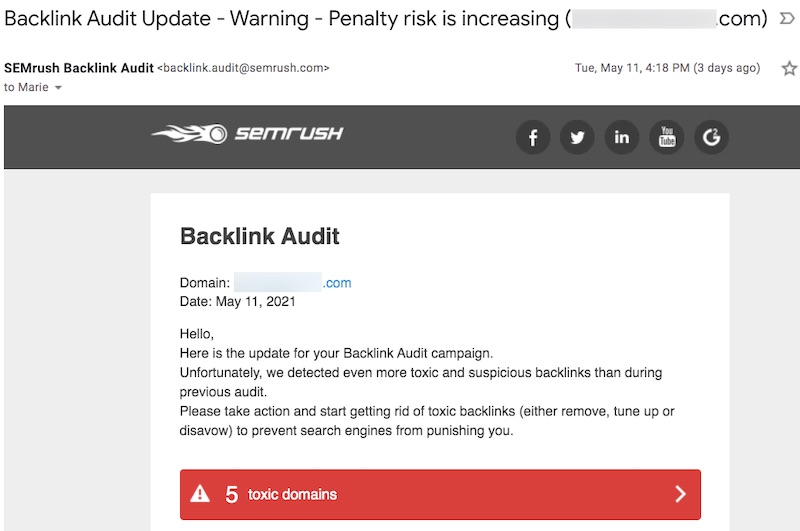
Warning – Penalty risk is increasing! The email says, “Please take action and start getting rid of toxic backlinks (either remove, tune up or disavow) to prevent search engines from punishing you.”
This bothers me each time I get this email, and even more when businesses reach out to me asking for a quote for a link audit after being told their penalty risk is increasing because of toxic links, when all they have is the type of “cruft” or spammy links that every site on the web gathers. We have had businesses ask us for a link audit based on this report despite never having done any link building in the past.
I shared this image with my team this week to show how each of the links that SEMrush has flagged as toxic here are, in my opinion, links that Google’s algorithms have been ignoring for a long time now.
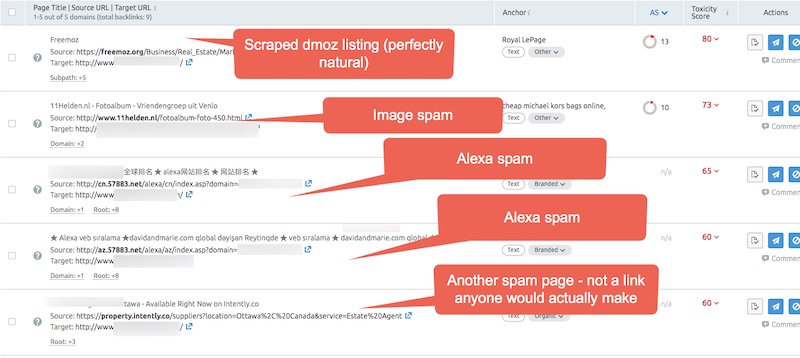
If you do have a site that could benefit from disavowing — and we believe most sites do not, unless you have been severely manipulating Google’s algorithms with link building — then these are not the links you are going after.
Conclusions
Our advice on disavowing has changed a few times over the years. We still do recommend a thorough link audit and disavow for some sites, but most who are reading this article would not be likely to benefit from using Google’s disavow tool. However, if you have been building links on a large scale, it is possible for these links to cause Google to place a suppression on your site, impeding its ability to rank to its full potential. In cases like this, disavowing has the potential to help.
Manual actions are given to sites that have overdone link building in ways that Google’s algorithms are not able to ignore, and in some cases, reward. Years ago, manual actions were given to sites who had built low quality directory links, comment spam, and other very obviously spammy links. In 2021, we are seeing far fewer requests for help with manual actions, and when we do have one, it’s not spammy links that are to blame. Rather, the site generally has been building what many SEOs would call “white hat” links, at scale.
Most manual actions for unnatural links we see these days are for sites that have done link building that many SEOs would consider white hat, but have done it on a massive scale.
We believe that Google is getting much better at determining which links to value as recommendations, which likely helps them decide which links to count and which to ignore on the web. Many sites that have seen declines in Google organic traffic over the last few years are ones that have been building links in guest posts, articles, round-up posts, and other methods generally accepted as white hat in many SEOs’ eyes. In most cases, we do not believe that these sites have been penalized. Rather, Google’s algorithms likely have figured out which of these links truly are recommendations worth counting. Disavowing is unlikely to reverse a slow erosion in traffic for sites that have seen this type of decline.
If your traffic has taken a downturn, our usual advice for improving site quality applies. Thoroughly read the Quality Raters’ Guidelines (or buy our book that contains much of the checklist we use when analyzing a website through the eyes of a quality rater), improve how you demonstrate E-A-T both on and off your site wherever possible, do all you can to be technically sound, and most importantly right now, look at what has changed in terms Google’s understanding of intent and relevancy for keywords that have lost rankings.
For those who are still struggling to determine whether you would benefit from a link audit and disavow, here is our current advice:
MHC’s Advice for disavowing in 2021
We recommend a thorough non-automated link audit, removal of self made links where possible, and a thorough disavow, followed by filing a reconsideration request. Know that manual actions generally take multiple requests to get removed in many cases now, and Google will often take two months or more to respond to each request.
We recommend a thorough non-automated link audit for any site that has a link profile that is manipulative enough to put them at high risk for receiving a manual action. If the majority of links in your profile are ones that you created for the purpose of passing PageRank, but really don’t represent actual recommendations of others then you fall into this category. In most cases we will file this disavow as well. Sometimes we file partial disavows. If a client is reluctant to disavow certain links, even though we know they were built for SEO, we will sometimes disavow the links that are most obviously manipulative and keep the more debatable mentions.
Our decision on whether or not to disavow depends on the scale of the problem. Sometimes we look at whether the site’s organic traffic has been impacted on a day which we felt was a link related update, although this is becoming less helpful lately. If you’re really on the fence about whether the scale of your link building is enough to cause problems, there is no harm in filing a disavow, provided you are not disavowing good links that Google really does want to count as recommendations. We have had some businesses ask us to file a disavow just for peace of mind that these links are unlikely to cause problems with Google’s algorithms or lead to a manual action in the future.
We generally do not recommend filing a disavow for cases like this. However, if your link profile prior to the attack was worthy of a manual action, or if you currently have a manual action, we would recommend adding these links into your disavow file. Some people are uncomfortable with having this type of link present in Google’s algorithms and do not trust Google to simply ignore these links. While we are confident that Google can ignore spam attacks of unnatural links, there is no harm in disavowing these links other than time spent. As an added note, sometimes an onslaught of spammy links can be an indication that your site has been hacked. It may be worth consulting with a specialist in malware and hacked sites.
If, after reading all of this, you are still unsure whether your site would benefit from using Google’s disavow tool, you can hire an MHC link auditor to review your link profile and give our opinion, or complete a full link by link audit of your backlink profile along with our recommendations for disavowing.
I have disavowed a lot of links over the years! It enjoyed looking back at old screenshots of the penalties I removed so many years ago. Google’s algorithms have changed dramatically since then. I do believe their goal is to truly determine which links are recommendations worth counting and to simply ignore links that are not. Disavowing still can help some sites…but only those who have been seriously overdoing it in terms of link building.
Thank you for reading this beast of an article. If you have quick questions on disavowing, I’m usually happy to answer those on Twitter. Or, if you’d like to consult with my team and I, you can tell us more about your site’s situation and we will let you know whether we think we can help.
If you found this helpful, you’ll love our newsletter!
Each week, every MHC team member contributes to the newsletter, writing on things they have learned from the SEO community, Google employees, SEO news and other sources. Our goal is to learn what Google loves and pass that on to you.
You may also like Marie’s podcast where she shares more thoughts like this every week
Questions, comments?
Have you used Google’s disavow tool in the last year? If so, do you feel it has helped? We would love for you to leave a comment or question below.



Comments
Very good article.
I’ve worked with SEO agencies that include link-building – (purchasing links), and performing link detoxes for their clients.
We first start by doing a detox and submitting a disavow file. Then the link acquisition starts. The links are from publishers that have a DM of 50 or higher – but have no relevancy to the client. In addition, the anchor text is always a keyword the client is trying to rank for. I have never seen a client’s keyword rankings or organic search results improve by buying links for them.
The sad part is, these agencies are charging clients up to $1000 per link. They are told that these links will improve their trust factor; thus improving their site’s authority with Google.
This is a great write-up! What do you think about the big media sites doing internal linking tools within articles and “seo footers”?
example of in-article links – https://www.learnreligions.com/primitive-baptist-beliefs-and-practices-700089
example of footer links – https://www.countryliving.com/life/g30896409/lent-quotes/ (scroll to the bottom right above the site footer, in code called )
We’ve been implementing similar internal linking within body content – much what wikipedia does as well. Is this not helpful for both the user and SEO in terms of internal link building?
Hi, what your take about image link spam? My blog have hundreds of them added everyday (blogspot, github, web.app, etc) and traffic plummeting fast since first detected.
The text used are snippets from the source(s) website image and merged, so it gibberish.
Hey Lim, great question! Ultimately, Google is quite good at ignoring spam. If you want to err on the side of caution you can disavow them, but disavowing can cause a lot of harm so we recommend being very delicate with it. You only want to disavow unnatural or spammy links, so be careful not to disavow any of your naturally earned good links. If you want more advice on your traffic drops, you could look at our algo page to see if any of your drops line up with known or suspected quality updates. Hope that helps!
In regards to your above answer. What if you did disavow domains from spammy links(you did not create) like web.app, blogspot, image links, and the new one I see is coupon links.
I feel it’s a double edge sword, I disavow and see a negative impact. With the new, remove disavowal links, is it safe to say I can take them out of the disavow file?
If you added these links to your disavow file because of a manual action, we wouldn’t just take them out. Generally we would not recommend taking things out of your disavow file (even if they are spammy links that Google ignores) unless you accidentally added a natural link. In this case, taking the link out of your disavow file and re-uploading could reavow that link. Reavowing spammy links won’t likely hold any positive effects because once reavowed, Google will just continue to ignore them. It may seem like negative impacts are from disavowing, but in reality it could be for a multitude of other reasons. If there are unnatural links, you should still leave them in there to be safe. As we mentioned, Google is quite good at ignoring spammy links and obvious linking patterns, so if you have a couple hundred spammy links pointing to you, we would ignore these.
It’s a very informative article in my carrier, I have experienced that auto-generated backlink which claims by Google that it will take care and Google bot will ignore those backlinks, but after disavowing those backlinks, I have seen improvement in traffic.
But I am still not sure how to audit those potentially toxic backlinks shown by SEMrush. That is still quite challenging.
Thanks for the article. We have seen an increase where sites will link to an image on our clients’ sites. Very spammy pages. What is your recommendation for those situations?
The types of links you’re describing, we could classify as extremely spammy links and are pretty obvious to identify, like you have said. We believe Google’s algorithms are sophisticated enough to the point that they can simply ignore these types of links. While there is likely no harm in disavowing them, we don’t believe you would need to go out of your way to disavow them or have them removed from your link profile. In our recent newsletter we’ve touched on how if the overwhelming majority of your links are unnatural, maybe you would want to consider disavowing your spammy links. But those are usually extreme cases where you should mostly be concerned here if you have been actively building unnatural links at scale. Again, straight out of a Google hangout with John M : “For most websites you don’t need to worry about toxic links. It’s something that our systems, when they run across links that they think are bad, we primarily ignore them.”
What about sites that have had relentless negative SEO attacks for many years? So frustrating we have NEVER spammed google but get penalised. It ruins lives and Google fail to accept it happens.
Hey Mike. If you’re experiencing a manual action, it seems more likely that there is something going on that is against Google’s guidelines rather than it being from negative SEO. If you want to have us dive into this a little more, please let me know.
https://www.mariehaynes.com/products/tools/disavow-blacklist-bulk-upload/
This link isn’t working! Could you please activate that tools and the option to make a payment is disabled, Please help.
Hi Talha, as of March 1 we dismantled the disavow blacklist. Here is the article discussing it: https://www.mariehaynes.com/disavow-blacklist-tool/